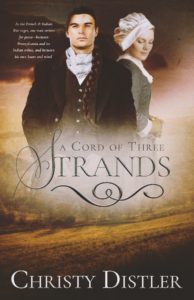My historical novel, A Cord of Three Strands, released one month ago, but the story has been in my head for twenty years now. Not that the book as it stands today is the same—or even similar—to what I originally envisioned. The planned time-slip novella set in my hometown of Horsham and involving my ancestors took a major detour as I researched important aspects: Friends (Quakers) in the eighteenth century, the French & Indian War, Pennsylvania Indian relations, and Colonial Pennsylvania life. In essence, as I researched and wrote the story and got to know one of the main characters, he led the way and I followed.
Isaac Lukens made his debut appearance in a dream I had after a day of genealogy research. My sixth-great-grandfather had a cousin by the name of Seneca Lukens, which made me question our family’s connection to the Indian tribe (the Seneca lived in northern Pennsylvania and southern New York during Colonial times). That night, Isaac—born to a French trader and a Lenape woman and reared by Quakers after his parents’ deaths—walked out of the woods at Graeme Park, a historical site in Horsham that was the home of Pennsylvania’s governor in the early eighteenth century.
The research that ensued sent me charging down some rabbit trails—except they weren’t rabbit trails at all. They were the result of Isaac’s backstory creating the character who’s now on the book’s pages: a man torn between two cultures (Lenape and Anglo) and, as a result of his pacifist Quaker upbringing, striving for peace between Pennsylvania and its Indian tribes and between his own heart and mind.
One of these “rabbit trails” led me to a bit of Pennsylvania history that I’d never learned, even in my AP American History class. In 1756, Quakers in Philadelphia formed the Friendly Association for Regaining and Preserving Peace with the Indians by Pacific Measures. This group worked to forge peace with the Lenape through treating them with respect and love, working to compensate them for their losses, and acting as a liaison between them and the government. The Friendly Association continued to meet with the Lenape and the Six Nations (who controlled the Lenape) throughout the French and Indian War period, providing needed provisions and assisting with peace treaties, some of which were more successful than others.
With this new knowledge, and the fact that Horsham is only twenty miles from Philadelphia, it seemed implausible that Isaac Lukens—a man who had just returned from living with the Lenape for two years—wouldn’t join the Friendly Association in their efforts. So I involved him, and together we embarked on a very different journey.
In the end, I couldn’t be happier with A Cord of Three Strands. A time-slip romance would be fun (and it might still happen—I haven’t given up on that storyline), but this book has become so much more, including a tribute to the Friends who worked tirelessly to improve Indian relations and refute slavery (another important part of the story).
Oh yeah. Back to Seneca Lukens. A few years ago, I learned he was more likely named for the Roman philosopher Lucius Annaeus Seneca than for the Seneca tribe. A bit disappointing, but all is not lost. The imagination, whether piqued by truth or speculation, is a wonderful thing.
 As 1756 dawns, Isaac Lukens leaves the Pennsylvania wilderness after two years with the Lenape people. He’s failed to find the families of his birth parents, a French trader and a Lenape woman. Worse, the tribe he’s lived with, having rejected his peacemaking efforts, now ravages frontier settlements in retaliation. When he arrives in Horsham, the Quaker community where he was reared, questions taunt him: Who is he—white man or Lenape? And where does he belong?
As 1756 dawns, Isaac Lukens leaves the Pennsylvania wilderness after two years with the Lenape people. He’s failed to find the families of his birth parents, a French trader and a Lenape woman. Worse, the tribe he’s lived with, having rejected his peacemaking efforts, now ravages frontier settlements in retaliation. When he arrives in Horsham, the Quaker community where he was reared, questions taunt him: Who is he—white man or Lenape? And where does he belong?
Elisabeth Alden, Isaac’s dearest childhood friend, is left to tend her young siblings alone upon her father’s death. Despite Isaac’s promise to care for her and the children, she battles resentment toward him for having left, while an unspeakable tragedy and her discordant courtship with a prominent Philadelphian weigh on her as well.
Elisabeth must marry or lose guardianship of her siblings, and her options threaten the life with her and the children that Isaac has come to love. Faced with Elisabeth’s hesitancy to marry, the prospect of finding his family at last, and the opportunity to assist in the peace process between Pennsylvania and its Indian tribes, Isaac must determine where—and to whom—the Almighty has called him.
A Cord of Three Strands is available on:
Amazon | Barnes & Noble | Apple Books | Google Play Books | Kobo | Other Retailers
I love to connect with my readers. You can find me on social media or on my website.
Website | Newsletter | Facebook | Twitter | Instagram | Pinterest
 For as long as she can remember, Christy Distler has dreamed her most vivid dreams with her eyes wide open. Names became people—people who didn’t exist in this time and place but couldn’t have been more real in her heart and mind. So she did the only rational thing: gave them a voice by writing fiction.
For as long as she can remember, Christy Distler has dreamed her most vivid dreams with her eyes wide open. Names became people—people who didn’t exist in this time and place but couldn’t have been more real in her heart and mind. So she did the only rational thing: gave them a voice by writing fiction.
Christy’s novels, whether historical or contemporary, delve into betrayal and reconciliation, faith and grace, and always involve the intertwining of cultures. When not writing, she works as an editor for publishing houses and independent authors.
Obsession with words (and history) aside, she lives with her husband, children, and dogs in Pennsylvania, less than two miles from where her Lukens ancestors settled more than three hundred years ago.
